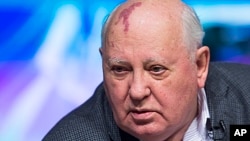GENEVA —
Mikhail Gorbachev has warned that environmental degradation threatens the health of the planet and the security of future generations. The former Soviet president's pessimistic assessment of the state of the environment came on the 20th anniversary of the founding of Green Cross International, the non-governmental organization he established after the 1992 Rio Earth Summit.
Mikhail Gorbachev led the Soviet Union from 1985 to 1991, and, during the final two years, was its first and last president. As Soviet leader, he embarked on the polices known as "glasnost," meaning openness, and "perestroika," meaning reconstruction. These iconic terms have become identified with his quest for political reform of the Soviet Union.
Now, Gorbachev finds these same terms resonating with his concerns for the environment. Via video from Moscow, the founder of Green Cross International says a sustainable perestroika is needed to overcome the unchecked exploitation of natural resources and prevent the further degradation of the environment.
Gorbachev says perestroika will not work without glasnost.
"In developing and implementing our plans and doing our work on the environment, what we need above all is glasnost," said Gorbachev. "Glasnost and again I say glasnost, so, it is totally wrong and unacceptable when some leaders and some businessmen are trying to force their way, are trying to do what they plan to do, to do their projects without regard for environmental consequences.”
Gorbachev accuses the international community of failing to respond to the threats facing humanity and the environment. He says this disregard of the environment has been going on for two decades. He warns putting profits over people in dealing with climate change and sustainable development is both shortsighted and dangerous.
The former Soviet leader notes the world population will surpass nine billion people by 2050. He says this population pressure, coupled with a crumbling world economy and unbridled exploitation of the earth’s natural resources, will aggravate today’s environmental crisis. He says it will lead to more human suffering, increase poverty, and cause more conflict.
"The economy should be re-oriented to other goals," he said. "It should include such public goods as sustainable environment, peoples’ health in the broadest sense of this word, education, culture, and social cohesion-including the overcoming of the huge gap between wealth and poverty.”
Gorbachev says the future is not preordained, but rather depends on what people do today. He says it is urgent to move from talk to action to save the environment.
He appeals especially to young people to act. He says young people want to live on a healthy planet. They do not want to live on what he calls "an empty planet." He says living on a planet that has no drinkable water would be a tragedy. Young people, he says, can prevent this from happening.
Mikhail Gorbachev led the Soviet Union from 1985 to 1991, and, during the final two years, was its first and last president. As Soviet leader, he embarked on the polices known as "glasnost," meaning openness, and "perestroika," meaning reconstruction. These iconic terms have become identified with his quest for political reform of the Soviet Union.
Now, Gorbachev finds these same terms resonating with his concerns for the environment. Via video from Moscow, the founder of Green Cross International says a sustainable perestroika is needed to overcome the unchecked exploitation of natural resources and prevent the further degradation of the environment.
Gorbachev says perestroika will not work without glasnost.
"In developing and implementing our plans and doing our work on the environment, what we need above all is glasnost," said Gorbachev. "Glasnost and again I say glasnost, so, it is totally wrong and unacceptable when some leaders and some businessmen are trying to force their way, are trying to do what they plan to do, to do their projects without regard for environmental consequences.”
Gorbachev accuses the international community of failing to respond to the threats facing humanity and the environment. He says this disregard of the environment has been going on for two decades. He warns putting profits over people in dealing with climate change and sustainable development is both shortsighted and dangerous.
The former Soviet leader notes the world population will surpass nine billion people by 2050. He says this population pressure, coupled with a crumbling world economy and unbridled exploitation of the earth’s natural resources, will aggravate today’s environmental crisis. He says it will lead to more human suffering, increase poverty, and cause more conflict.
"The economy should be re-oriented to other goals," he said. "It should include such public goods as sustainable environment, peoples’ health in the broadest sense of this word, education, culture, and social cohesion-including the overcoming of the huge gap between wealth and poverty.”
Gorbachev says the future is not preordained, but rather depends on what people do today. He says it is urgent to move from talk to action to save the environment.
He appeals especially to young people to act. He says young people want to live on a healthy planet. They do not want to live on what he calls "an empty planet." He says living on a planet that has no drinkable water would be a tragedy. Young people, he says, can prevent this from happening.




